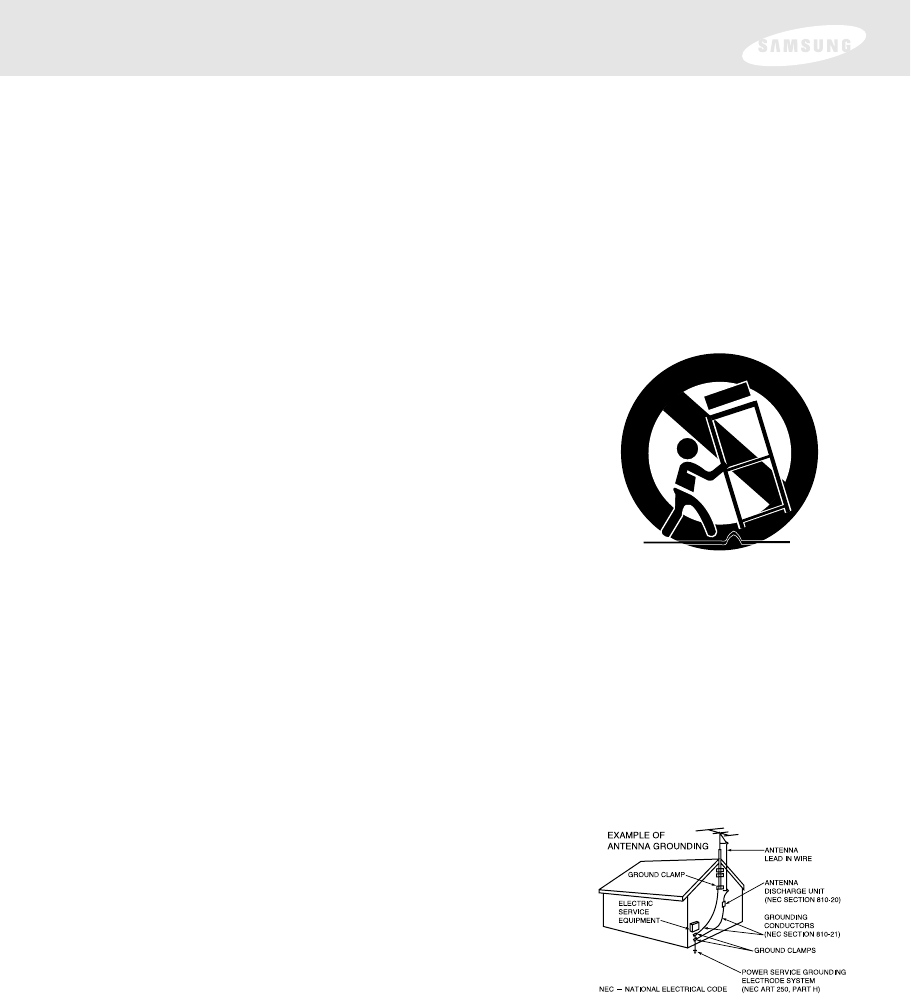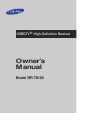
Warning! Important Safety Instructions
• Unplug the product from the wall outlet before cleaning. Use a damp cloth; do not use liquid or aerosol
cleaners.
• Never add any attachments and/or equipment without approval of the manufacturer. Such additions can
increase the risk of fire, electric shock, or other personal injury.
• Do not use the product where contact with or immersion in water is a possibility, such as near bath tubs, sinks,
washing machines, swimming pools, etc.
• Do not place the product on an unstable cart, stand, tripod, bracket, or table where it can fall. A falling product
can cause serious injury to a child or adult, and serious damage to the appliance. Use only with a cart, stand,
tripod, bracket, or table recommended by the manufacturer or sold with the product. Follow the manufacturer’s
instructions when mounting the unit, and use a mounting accessory
recommended by the manufacturer. Move the product and cart with care.
Quick stops, excessive force, and uneven surfaces can make the unit and
cart unsteady and likely to overturn.
• Provide ventilation for the product. The unit is designed with slots in the
cabinet for ventilation to protect it from overheating. Do not block these
openings with any object, and do not place the product on a bed, sofa, rug,
or other similar surface. Do not place it near a radiator or heat register. If
you place the product on a rack or bookcase, ensure that there is adequate
ventilation and that you have followed the manufacturer’s instructions for
mounting.
• Operate your product only from the type of power source indicated on the marking label. If you are not sure of
the type of power supplied to your home, consult your appliance dealer or local power company.
• Use only a grounded or polarized outlet. For your safety, this product is equipped with a polarized alternating
current line plug having one blade wider than the other. This plug will fit into the power outlet only one way. If
you are unable to insert the plug fully into the outlet, try reversing the plug. If the plug still does not fit, contact
your electrician to replace your outlet.
• Protect the power cord. Power supply cords should be routed so that they will not be walked on or pinched by
objects placed on or against them. Pay particular attention to cords at plugs, convenience receptacles, and the
point where they exit from the unit.
• Unplug the product from the wall outlet and disconnect the antenna or cabling during a lightning storm or when
left unattended and unused for long periods of time. This will prevent damage to the unit due to lightning and
power-line surges.
• Avoid overhead power lines. An outside antenna system should not
be placed in the vicinity of overhead power lines or other electric
light or power circuits or where it can fall into such power lines or
circuits. When installing an outside antenna system, be extremely
careful to keep from touching the power lines or circuits. Contact
with such lines can be fatal.
• Do not overload the wall outlet or extension cords. Overloading can
result in fire or electric shock.
• Do not insert anything through the openings in the unit, where they can touch dangerous voltage points
or damage parts. Never spill liquid of any kind on the product.
• Ground outdoor antennas. If an outside antenna is connected to the product, be sure the antenna is
grounded so as to provide some protection against voltage surges and built-up static charges. Section 810
of the National Electrical Code, ANSI/NFPA No.70-1984, provides information about proper grounding of
the mast and supporting structure, grounding of the lead-in wire to an antenna discharge unit, size of
grounding conductors, location of antenna discharge unit, connection to grounding electrodes, and
requirements for the grounding electrode.


















